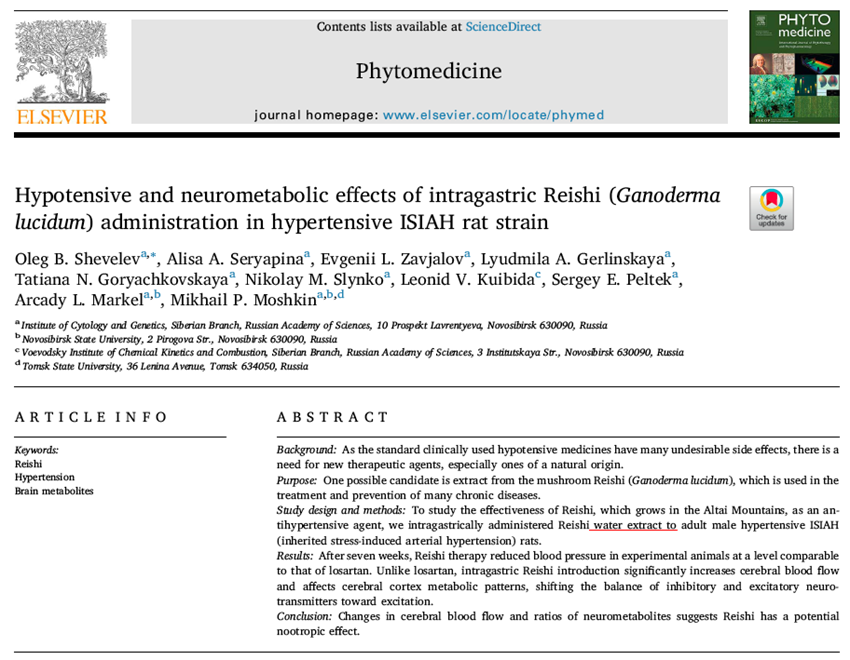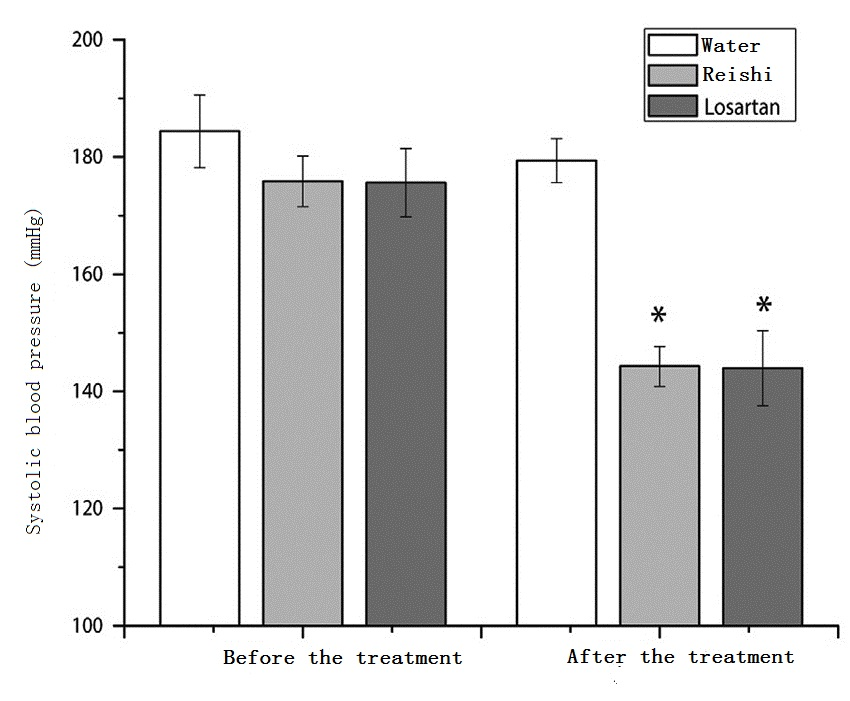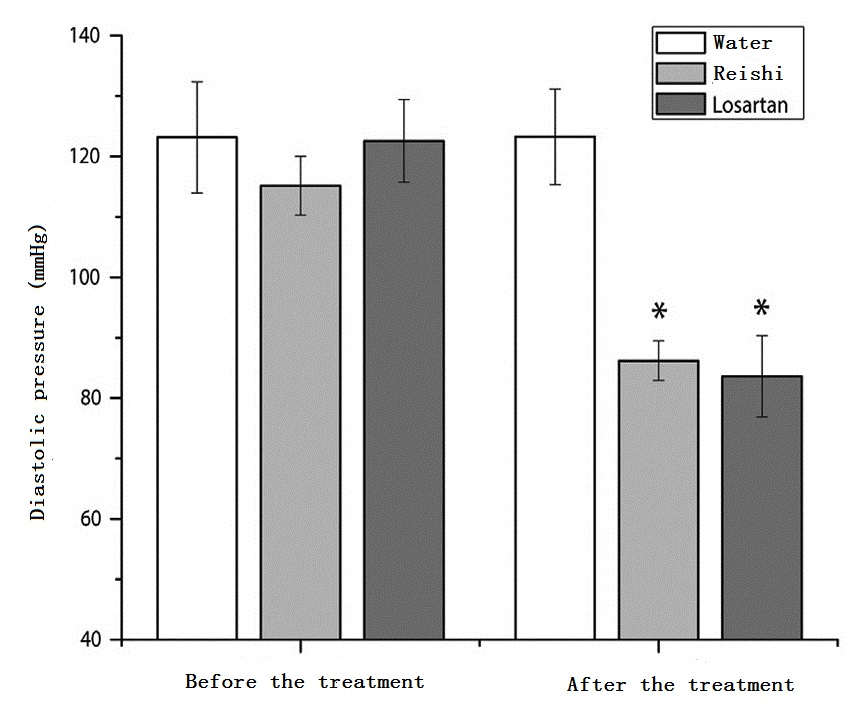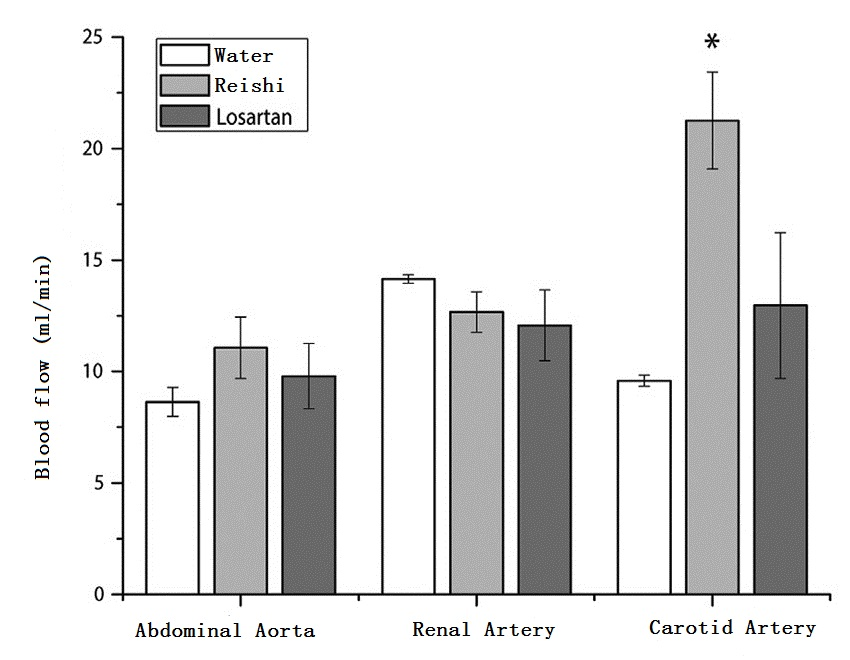March 1, 2018 / Russian Academy of Sciences / Phytomedicine
Text / Wu Tingyao
In March 2018, a paper published in Phytomedicine by the Institute of Cytology and Genetics of the Russian Academy of Sciences confirmed that after seven weeks of feeding Ganoderma lucidum (Reishi) fruiting body water extract to rats suffering from inherited stress-induced arterial hypertension, the hypotensive effect of Ganoderma lucidum water extract is comparable to that of Losartan (see Figure 1).
The animal experiment also found that for hypertensive rats treated with Ganoderma lucidum water extract, the blood flow volume of their carotid artery substantially increased, about twice as much as that of those without any treatment (see Figure 2). At the same time, the carotid artery diameter and blood flow rate also increased significantly. This means that the blood flow to the rat’s brain is not reduced by the drop in blood pressure but instead becomes more active and abundant under the influence of Ganoderma lucidum. In contrast, although the carotid artery diameter of the rats in the hypotensive drug group increased, the blood flow rate did not exceed that of the control group, and the blood flow volume was not significantly different from that of the control group.
In March 2018, a paper published in Phytomedicine by the Institute of Cytology and Genetics of the Russian Academy of Sciences confirmed that after seven weeks of feeding Ganoderma lucidum (Reishi) fruiting body water extract to rats suffering from inherited stress-induced arterial hypertension, the hypotensive effect of Ganoderma lucidum water extract is comparable to that of Losartan (see Figure 1).
The animal experiment also found that for hypertensive rats treated with Ganoderma lucidum water extract, the blood flow volume of their carotid artery substantially increased, about twice as much as that of those without any treatment (see Figure 2). At the same time, the carotid artery diameter and blood flow rate also increased significantly. This means that the blood flow to the rat’s brain is not reduced by the drop in blood pressure but instead becomes more active and abundant under the influence of Ganoderma lucidum. In contrast, although the carotid artery diameter of the rats in the hypotensive drug group increased, the blood flow rate did not exceed that of the control group, and the blood flow volume was not significantly different from that of the control group.
Figure 2 The effect of Ganoderma lucidum water extract on arterial blood flow volume
[Note] The experiment process is the same as above. After seven weeks of treatment, the carotid blood flow volume of the Reishi group was significantly higher than that of the other two groups. (Source/Phytomedicine.2018 Mar 1; 41:1-6.)
Further analysis of the 12 main neurotransmitters secreted by the cerebral cortex of each group of rats, it was found that the water extract of Ganoderma lucidum fruiting body can change the ratio of certain neurotransmitters, making the inhibitory neurotransmitters (such as glycine, referred to as Gly) and excitatory neurotransmitters (such as glutamine, referred to as Glx) closer to a balanced state, and such a state is conducive to normal blood pressure.
This result shows that compared to Losartan, which antagonizes the antagonist of AT1 receptors of angiotensin Ⅱ to dilate blood vessels and control blood pressure, Ganoderma lucidum water extract is more complicated in regulating blood pressure and is related to the regulation of the cranial nervous system.
The animal model used in the experiment is “inherited stress-induced arterial hypertension”, that is, the constitution inherited from the father or mother that easily causes high blood pressure, and mental stress is the main inducing factor. This is actually in line with the condition of most patients with hereditary hypertension of unknown etiology: autonomic nervous system disorders caused by stress (the regulatory function imbalance between the sympathetic nerve dominated by excitatory neurotransmitters and the parasympathetic nerve dominated by inhibitory neurotransmitters) makes blood pressure always high and difficult to return to normal levels.
If you don’t understand the relationship between autonomic nerve and blood pressure, you can imagine that blood pressure spikes due to emotional excitement (which is dominated by the sympathetic nervous system) while watching a football game, but blood pressure drops back to normal after a period of rest (which is dominated by the parasympathetic nervous system). This is the normal regulation mechanism. Once the blood pressure cannot return to normal by rest, sleep, and emotional relaxation, there will be a problem of high blood pressure. As for whether the blood pressure reaches the medically defined disease condition that requires medication, it depends on whether the systolic or diastolic blood pressure exceeds the prescribed value - as long as one of them is abnormal, it is considered high blood pressure.
There are several areas of the brain that can affect blood pressure and mood. Normally, they are regulated by the cerebral cortex (the “brain’s highest cognitive ability control center”). Previously, another group of researchers from the Russian Academy of Sciences has confirmed that in rats with “inherited stress-induced arterial hypertension”, the cerebral cortex secretes more excitatory neurotransmitters, keeping the blood pressure high. Now, in experiments with Ganoderma lucidum, it has been observed that oral administration of Ganoderma lucidum water extract for seven consecutive weeks can regulate the neurotransmitters secreted by the cerebral cortex and fundamentally improve hypertension.
As for those hypertensive rats that ate Ganoderma lucidum fruiting body extract, their cerebral blood flow increased and their blood flow rate increased. Therefore, the researcher pointed out at the end of the report that Ganoderma lucidum extract may have a potential nootropic effect.
Whether eating Ganoderma lucidum can really produce nootropic effects, it has to be proved by another experiment. But for patients with high blood pressure whose etiology is unknown (not caused by diabetes and kidney disease), Ganoderma lucidum products containing Ganoderma lucidum fruiting body extracts should be worth a try. At least Ganoderma lucidum does not produce side effects such as dizziness, nasal congestion, cough, and nausea common to general antihypertensive drugs.
It is worth mentioning that past studies have confirmed that Ganoderma lucidum triterpenes can inhibit the activity of angiotensin converting enzyme (ACE) so that Angiotensin I secreted by the kidney cannot be catalyzed by ACE into Angiotensin II that can promote vasoconstriction. Now, the water extract of Ganoderma lucidum fruiting body, which is mainly composed of polysaccharides, has been proven to improve high blood pressure by regulating the cranial nervous system. The complementarity of triterpenoids and polysaccharides once again confirms that Ganoderma lucidum with complete ingredients (containing both triterpenoids and polysaccharides) is the ideal choice.
[Source] Shevelev OB, et al. Hypotensive and neurometabolic effects of intragastric Reishi (Ganoderma lucidum) administration in hypertensive ISIAH rat strain. Phytomedicine. 2018 Mar 1; 41:1-6.
END
About the author/ Ms. Wu Tingyao
Wu Tingyao has been reporting on first-hand Ganoderma information since 1999. She is the author of Healing with Ganoderma (published in The People’s Medical Publishing House in April 2017).
★ This article is published under the exclusive authorization of the author. ★ The above works cannot be reproduced, excerpted or used in other ways without the authorization of the author. ★ For violations of the above statement, the author will pursue relevant legal responsibilities. ★ The original text of this article was written in Chinese by Wu Tingyao and translated into English by Alfred Liu. If there is any discrepancy between the translation (English) and the original (Chinese), the original Chinese shall prevail. If readers have any questions, please contact the original author, Ms. Wu Tingyao.
Post time: Dec-06-2021



